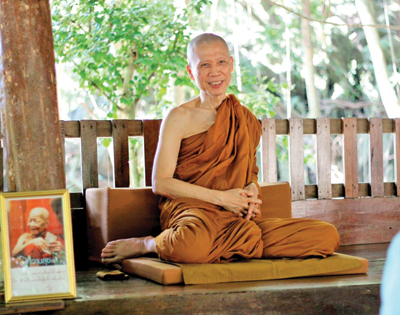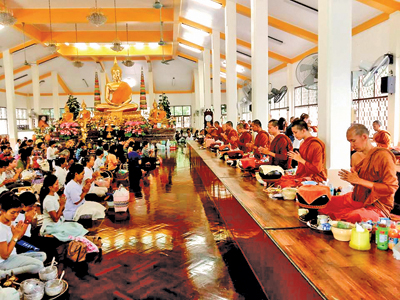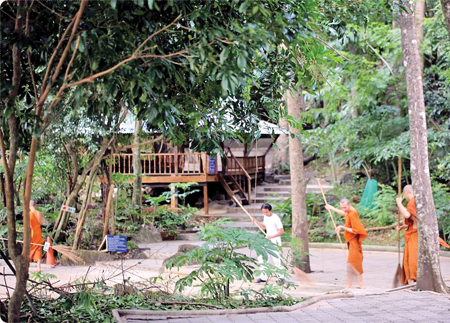Following are excerpts from an interview with Theravada Bhikkhu Ven. Ajahn Suchart Abhijato Maha Thera of Thailand. The Maha Thera is well known across the globe for his effective Dhamma teaching methods and meditation practice.
Q: In war zones such as the Gaza Strip thousands of people get killed brutally. Not every living being experiences such a tragic death. Why do people die in thousands so tragically? What is the interpretation according to the Buddha’s teachings?
A: According to the Buddha everyone who is born will die. So it does not matter how they die. We all die. That’s all. So the way one dies does not matter.
Q: But why do thousands of people get killed at once?
 A: Well, look at the Covid-19 pandemic. How many millions of people died? It is a lot more than the number of people dying in Palestine right now. When compared to the number of deaths caused by Covid-19, it is only a few thousand. Did you study the statistics on Covid-19 deaths? I think it is hundreds of millions. You have to look at the big picture. The big picture is everybody dies. In each country, thousands of people die every day, from natural causes, from old age, from sickness. There is always some type of cause for the people to die. But they do not become news because they are not sensational. That is all. When it comes to war crimes, however, even if only 18 people are shot dead, it becomes a big story. But, in fact, there may be more than 200,000 people dying on the same day across the globe. But we do not make it news.
A: Well, look at the Covid-19 pandemic. How many millions of people died? It is a lot more than the number of people dying in Palestine right now. When compared to the number of deaths caused by Covid-19, it is only a few thousand. Did you study the statistics on Covid-19 deaths? I think it is hundreds of millions. You have to look at the big picture. The big picture is everybody dies. In each country, thousands of people die every day, from natural causes, from old age, from sickness. There is always some type of cause for the people to die. But they do not become news because they are not sensational. That is all. When it comes to war crimes, however, even if only 18 people are shot dead, it becomes a big story. But, in fact, there may be more than 200,000 people dying on the same day across the globe. But we do not make it news.
Q: Is the country or region to which you are born determined by your past Kamma? To what extent can we argue that persons born in troubled, underdeveloped, or war-torn areas have committed a lot of bad Kamma in their past births in order to be born there?
A: It does not matter really. Wherever they are, they will die. Besides, we do not have the psychic power to trace all the past actions of these people. So we cannot really say anything about it except that you should look at the truth – look at the real situation and understand that this is the law of the three Characteristics of Existence, anicca, dukkha, and anatta.
Q: What is true happiness according to Buddhism? How would you define Buddhism and its purpose?
A: Buddhism is about calming the mind by various methods – doing charity can calm your mind to one level, keeping the Precepts will calm your mind to another level, meditation will calm your mind to yet another level and developing wisdom will calm your mind completely. Then you will feel calm all the time. So these are the practices taught by the Buddha to bring happiness to the mind.
The Buddha did not ‘say’ “go on a holiday to be happy.” The Buddha said, “give your money you are going to spend on holiday on charity, then you feel happier.” Try it.
When you want to buy something, a luxury item you do not need, give that money away instead. You will feel happier. This is a charity – Happiness of the heart.
Q: Animals get killed in laboratories for research purposes. Is it ethical to use/ animals for such testing?
A: It is not ethical. But this is human nature. Human nature is driven by the defilements – Kelesas. We are all selfish. Humans want to get/obtain things and seek to benefit themselves at the expense of poor and helpless animals. No morality. If you practise morality then you do not perform these kinds of acts.
Q: According to the Five Precepts that we observe daily, we should abstain from telling lies as it is a sin. What about idle chattering and using abusive language? Why aren’t ‘abstaining from idle chattering and abusive language’ included in the Fourth Precept?
A: It is not a sin. It is more like a refined precept. If you want to lead a respectable life, you should not do idle chattering or use abusive language. This is more for the Ordained such as Bhikkus or Nuns. If they wish to be more respectable, they should refrain from idle chattering and abusive language. However, it is not a sin. But abstaining from idle chattering and abusive language will make you feel better, look good, more refined, or more civilised.
Q: Zoos keep animals in captivity for the sole purpose of human entertainment. Should we have zoos at all? Why do Buddhist countries still promote the concept of zoos?
 A: Because they are Buddhists by name, but not by practice. If you are a practising Buddhist then you have to have compassion. You have to have loving kindness towards all living beings. So you do not want to hurt them or make them unhappy, you only want to make them happy. So if you are a true Buddhist, you will never put anybody in captivity, because you can imagine how you would feel if you were undergoing a similar plight.
A: Because they are Buddhists by name, but not by practice. If you are a practising Buddhist then you have to have compassion. You have to have loving kindness towards all living beings. So you do not want to hurt them or make them unhappy, you only want to make them happy. So if you are a true Buddhist, you will never put anybody in captivity, because you can imagine how you would feel if you were undergoing a similar plight.
Q: Does this imply that many Buddhist countries are Buddhist just in name and not in practice?
A: Well, they practise it only to a certain level. They might have respect for the Buddha, Dhamma, and the Sangha. They pray or ask for blessings and may be doing some charity work as well. But they overlook the fact that keeping animals in cages is not an act of charity/ act of kindness. Instead, if you wish to do charity, you should set all animals free!
Q: There are millions of fish in the ocean, and the term “fish harvest” refers to fish that have recently been caught. There are many views including some religious ones that subtly endorse the killing of animals for human consumption. What is the Buddhist view?
A: Just think of yourself. If somebody thinks that your body is good for their consumption how would you feel? So if you do not want to let somebody harm you, then you do not want to do that to them.
Do unto others as you would have them do unto you: this is Christian teaching. It is the same thing in Buddhism.
The Buddha said we should not hurt other people at any cost. We should not hurt other people or animals. We should be kind and loving.
Q: Millions of turkeys are raised for food and killed for festivals like Thanksgiving. This is just one example. Aren’t these festivals promoting the slaughter of animals?
A: They can eat vegetables. They do not have to eat turkey. But I guess they follow the original tradition [1621 feast of the pilgrims] where the pilgrims could find only turkeys in America.
So actually they are celebrating more than thanking. If they are being thankful they should not kill anyone, because they should value life. If they value their own life they should value other people’s life as well. That is all.
Q: Whether humans or animals?
 A: There is no difference, whether humans or animals. We all love our bodies and we do not want anybody to kill us.
A: There is no difference, whether humans or animals. We all love our bodies and we do not want anybody to kill us.
Q: Those who buy meat at meat stalls do not slaughter the animals. It’s done by the butcher. Do they commit a sin by purchasing meat from meat stalls?
A: If you do not tell the butcher ahead of time that you need meat (that you need two chickens etc), you are not breaking any Precepts. But if you do tell the butcher that you need meat ahead of time then you are simply asking them to kill for you.
Then you are breaking the Precepts. If you just go to the meat stall and buy whatever is available there then you are not breaking any Precepts as you have not contributed to the act of the butcher- killing of the animal. But if you pre-order or rather if you say that you want turkey for your Thanksgiving dinner, for example, that means you tell the butcher ahead of time.
Then the butcher will have to go and kill a turkey for you. But if the butcher just decides to kill the turkey and hopefully somebody would buy from him, then the buyer is not breaking any Precepts. It is the butcher who is breaking the Precept.
Q: But the butcher knows that somehow, somebody will come and buy his meat and that is why he kills the animal. That means the person who buys any type of meat from the butcher, indirectly contributes to animal killing. Am I correct?
A: Yeah, you can say that, but still you do not perform the act or rather kill the animal. So you do not break the Precept. And if the butcher decides to keep the Precept then there won’t be any meat to sell anyway. So it is better to tell the butcher to keep the Precept. That will solve the problem of killing. If everybody keeps the Precept then we all become vegetarians.
Q Does an animal commit a sin by catching or killing an animal for prey or during a fight?
A: Yes, it breaks the Precept. Regardless of who you are, if you kill you are breaking the Precept -you are doing bad Kamma and you have to pay the consequences eventually. The animal might have to be reborn as an animal again and be eaten by other animals for instance.
Q: The lay life vastly differs from the monastic life. They go to school, get graduated, get married, and maintain a balance between their family life and office work. What is the Buddhist interpretation of this?
A: Well, The Buddha understood that this is human nature. Humans have to exist happily and easily and for that they need education. So you have to learn a new skill and use it as a way of making a living. The Buddha said that it is a good action. In the Mangala Sutta, one of the auspicious actions is to obtain a good education – to learn crafts and develop skills so that you can use it to make a clean living.
Then you do not have to steal, you do not have to go and kill others. This is considered good action according to the Buddha.
Q: Is the Human realm better than the Deva realm? Which is the best realm – Deva or Human?
A: Yes, it is easier for humans to access a teacher to learn the Dhamma than being a Deva. A Deva needs a teacher who can access the Deva like the Buddha or someone with psychic power. But not all noble disciples have psychic power.
Q: Can Devas attain nirvana?
A: Yes, the Devas can attain the highest level. If they keep on practising they can achieve the highest level- Nibbana. However, they will find it difficult to have access to a teacher because it is very rare that the noble disciples have psychic power that is necessary to reach the Devas.
Q: What distinguishes Buddhism from other religions?
A: Well, I cannot really say anything about other religions because I do not practise or study them. I can only say that Buddhism is not really a religion; it is a path to liberation from suffering. That is what it is. It is a way of life, a way of practice.
Q: Could you recommend a mindfulness meditation practice that we could do daily?
A: Yes, if you can, try to find some free time to meditate. You have to set up a certain schedule in order to be able to do it because usually, your mind does not like to meditate. You try to forget or try to find reasons for not doing it. So if you really want to do it, if you think that meditation is good for you, then you should set up a schedule and try to stick to the schedule.
The most appropriate time for meditation would be in the evening before you go to bed or in the morning after you get up. Then you can easily sit down and you can either watch your breath or recite a mantra like “Buddho,Buddho.” You have to select only one, not both. Try to stay focused on your breath or mantra. Try not to think. When you can do this, your mind will become calm gradually and you will feel more peaceful and happy.
– Ven. Ajahn Suchart Abhijato Maha Thera was born on November 2, 1947. Having completed his degree in Civil Engineering at California State University, Fresno, USA, he returned to his motherland where he designed an ice cream parlour for a brief stint.
Quite soon, inspired by a Dhamma book, he decided to go in search of “true happiness,” to find inner peace through the practice of Buddhist meditation. He became a bhikkhu at the age of 27 and received ordination at Wat Bovornives in Bangkok on February 19, 1975, with Somdet Phra Ñanasarivara, the late Supreme Patriarch (Somdet Phra Sangharaja), as his preceptor.
Ven. Ajahn Suchart Abhijato Maha Thera resides in Wat Yansangwararam, Thailand.







